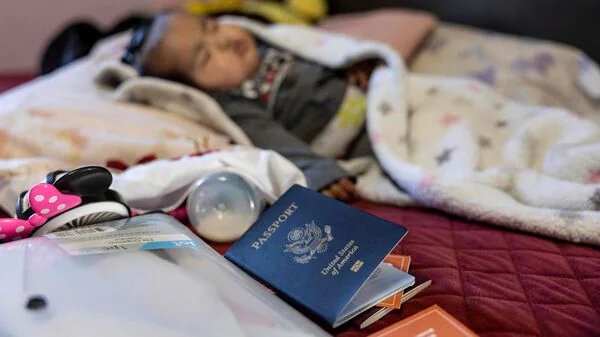
Trump Eyes Stricter 'Green Card' Scrutiny. Should H-1B Visa Holders, Lprs Sponsoring Parents Be Worried?
The package can potentially subject green card applicants to greater scrutiny over their use of public benefits. The package, filed with the Office of Information and Regulatory Affairs (OIRA) on 3 November, is listed on the federal regulatory review website as a proposed rule, according to a report by Newsweek.
Also Read | Who is Uriel Rivera Martinez? Man seen groping Mexico president in viral clipThe text of the proposal has not yet been released, so the specific changes USCIS may implement remain unclear.
What's concerning?If the proposal moves to formal rulemaking with notice, it would represent a major reversal from the 2022 public-charge policy, which limited consideration to cash welfare and government-funded long-term care, while exempting non-cash programs like SNAP, standard Medicaid, housing assistance, and WIC, a report by Newsweek stated.
Also Read | H-1B visa news: Trump administration pushes for 'stricter rules, and Cap limits'Embedded in the Immigration and Nationality Act, the public-charge bar authorises US agencies to block entry or status changes for non-citizens judged prone to heavy reliance on government aid.
Should Indians be worried?The change aligns with Trump's vows for mass deportations, H-1B restrictions, and ending“birthright citizenship,” signalling a tougher stance on family-based and employment-based immigration, pathways heavily used by Indians.
India is the largest source of US Green card applicants (over 70,000 annually via employment, family ties), with backlogs exceeding 1 million for EB-2/EB-3 categories. Indians, especially H-1B holders, green-card applicants, and LPRs sponsoring parents, face heightened risk under the revived rule.
Also Read | Trump 5% 'Remittance Tax' Explained: Who Will Be Impacted And What It Means?High-skilled workers: Many Indians on H-1Bs avoid benefits to maintain“public charge” eligibility, but dual-income families with U.S.-born children often use SNAP or school lunches during job transitions. A broader rule could flag even minimal use, complicating adjustments of status. Employment-based pathways stay more secure for Indian applicants, but consular interviews in Mumbai and Delhi frequently flag low liquid assets. Green card holders retain their status, though supporting family grows extremely hard under tighter I-864 scrutiny.
Family-Based Immigration: Family-based petitions (IR-5 for parents) may be denied if the household income falls below 250–300% of the poverty guidelines or if applicants have ever used SNAP/Medicaid.
Migration Policy Institute (MPI) Report projected 20–30% denial spikes for family petitions (like IR-5) under expanded rules; highlights Indian nationals (38% of EB backlog) facing asset scrutiny in consular processing.
Subsidies: Indians frequently access subsidised programs like CHIP (children's health insurance) or student aid. If these count against“totality of circumstances” (income, health, skills), it could deter applications or lead to more Requests for Evidence (RFEs).
Also Read | India vs US healthcare: 'Which is better?' American woman prefers India because...MPI report stated that documents show a 15–25% drop in Medicaid/SNAP enrollment among immigrant families (including South Asians) amid worsening health access during crises like COVID.
National Immigration Law Center (NILC)'s“Chilling Effects of Public Charge Policies” analysis indicates records 15–25% drop in benefit uptake among Asian immigrants, including Indians and further warns of health access barriers for LPRs and applicants.
Silver lining?However, the OIRA listing confirms that USCIS has forwarded a draft regulation for mandatory review, a prerequisite to issuing a Notice of Proposed Rulemaking in the Federal Register. Such notice would open a public comment period and offer further details on enforcement.
80,000 non-immigrant visas revoked since JanuaryPresident Donald Trump's administration has revoked around 80,000 non-immigrant visas since its inauguration on January 20 for offences ranging from driving under the influence to assault and theft, a senior State Department official said on Wednesday.
The extent of the revocations, first reported by the Washington Examiner, reflects a broad immigration crackdown initiated when Trump came into office, deporting an unprecedented number of migrants, including some who held valid visas.
The administration has also adopted a stricter policy on granting visas, with tightened social media vetting and expanded screening.
Around 16,000 of the visa revocations were tied to cases of driving under the influence, while about 12,000 were for assault and another 8,000 for theft.
U.S. Secretary of State Marco Rubio in May said he has revoked the visas of hundreds, perhaps thousands, of people, including students, because of involvement in activities that he said went against U.S. foreign policy priorities.
Directives from the State Department this year have ordered U.S. diplomats abroad to be vigilant against any applicants whom Washington may see as hostile to the United States and with a history of political activism.
Trump administration officials have said that student visa and green card holders are subject to deportation over their support for Palestinians and criticism of Israel's conduct in the war in Gaza, calling their actions a threat to U.S. foreign policy and accusing them of being pro-Hamas.
Legal Disclaimer:
MENAFN provides the
information “as is” without warranty of any kind. We do not accept
any responsibility or liability for the accuracy, content, images,
videos, licenses, completeness, legality, or reliability of the information
contained in this article. If you have any complaints or copyright
issues related to this article, kindly contact the provider above.


















Comments
No comment